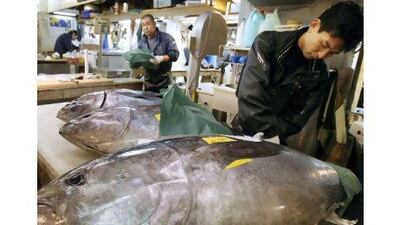The Fukushima nuclear emergency in Japan has taken its toll on the multibillion-dollar global market for Japanese speciality foods, with import restrictions hitting foodstuffs such as high-priced tuna and vegetables.
Import bans on perishable goods are preventing restaurants and supermarkets around the world from buying Japanese fish, exports of which were worth US$1.69 billion (Dh6.2bn) to the Japanese economy in 2008, according to the latest available data from the UN Food and Agriculture Organization.
The loss of the Japanese market has left importers scrambling for alternative sources of bluefin tuna, which sushi restaurants prize for otoro, a lean cut from the fish's belly with an unmistakable flavour.
"It's a big seller," said Shane MacNeill, the head chef at Yotto, a sushi bar at the Yas Marina Hotel. "When fresh, it's incredibly tasty and very soft."
Otoro is typically the priciest type of fish available at sushi restaurants. Two pieces of nigiri sushi, made with otoro, cost Dh40 at Yotto.
However, Mr MacNeill said the impact of the nuclear quarantine was not limited to fish.
"We use fresh Japanese vegetables, including shishito peppers and yuzu, a type of Japanese citrus."
The restaurant also imported sea urchin fresh from Japan for use in sushi, maki rolls and a classical Japanese dish called chawanmushi, a kind of steamed egg custard. "Since what's happened, we've stopped importing," Mr MacNeill said.
Last week, the UAE joined countries including the US and Canada in restricting the imports of some Japanese produce.
The Ministry of Environment and Water on Thursday banned imports of fresh Japanese perishables including vegetables, fruits, dairy products, meat and seafood.
Wholesalers of Japanese produce said the ban would have abig impact on sales. "There are so many Japanese products that we're not able to import now," said one distributor at Fresh Express, one of the UAE's major importers, who asked not to be identified.
He said while bluefin tuna and octopus could be sourced from the Mediterranean and had not yet been subject to major fluctuations in price, vegetables and other produce were proving more difficult.
"We're trying to source a lot of the produce from China … the quality will be different for some items, but very few."
Up to 2 tonnes of bluefin tuna are sold throughout the UAE every month, sourced from Spain, Malta, Greece and Portgual, according to Fresh Express.
Bluefin tuna meat sells for Dh350 to Dh400 per kilogram. A single tuna, weighing about 170kg, typically produces about Dh28,000 worth of meat once wastage is cleaned off. Mr MacNeill said.
But the lack of Japanese tuna production could accelerate the depletion of dwindling stocks of Mediterranean bluefin. The EU caps the amount of bluefin that can be caught each year to preserve its native species.
While other species of tuna, such as yellowfin and albacore, could be used in the same dishes, Mr MacNeill said they were poor substitutes.
"You won't get that kind of succulent, juicy flavour that you'd get from the bluefin," he said.

